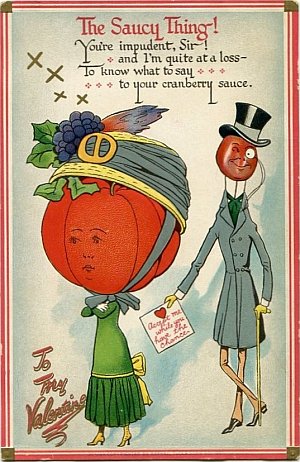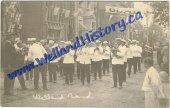A VALENTINE
 That Was a Long Time Coming
That Was a Long Time Coming
By Edna Winthrop
[People’s Press, 18 February 1913]
In 1849 Edward Poindexter left his home in the most east and his ladylove, Ellen Crane, to join the gold hunters in California. She received several letters from him, the last at the beginning of the new year, the mid-year of the nineteenth century. In this letter, Poindexter said: “I shall send you a valentine, calculating to mail it so that it shall reach you on the 14th of February. The mails are the surest means of transportation from here to the east, but, even they are not very regular. If you don’t receive my valentine, say, within ten days after Valentine’s day, go to the postoffice and inquire for it, writing me at the same time.”
The 14th of February came, but no valentine. Instead a letter came saying that Poindexter had been taken ill a fortnight before and had died. He had struck a vein of ore, which he had instructed the writer to sell and send her the proceeds.
The mine was afterward sold for $20,000 and the money sent to Miss Crane. She never married, but a brother having died, leaving a little girl named for her, Aunt Ellen brought her up. The aunt died when little Ellen was twenty years old. Ellen Crane Jr., inherited the $20,000 her aunt had received from her lover in California. The niece was engaged to be married to Walter Browning, a young man occupying the position of teller in a bank, and expected soon to be a bride.
One evening shortly before St. Valentine’s Day, Walter Browning, who was expected by his fiancee, came to see her with every evidence of distress. A thousand dollar banknote had slipped through his fingers and disappeared. He had handled a package of notes of the denomination of $1,000 each, and was satisfied that there were ten of them. They had been deposited as such an amount during the day, but when he came to count them later, there were only nine of them.
The misfortune weighed heavily upon the lovers, who were at the time expecting to be married in a few days. Indeed, Browning assigned the error he had made to this very cause. One about to be married is not likely to have all his wits about him, and he realized that he was not, in his condition, fitted for the very important work he was doing. Ellen asked him if her could remember any interruption that had occurred while receiving the money. He thought hard for a few minutes then said that after making the entry, in the depositor’s passbook, while the bills were on the counter, the cashier had called to him to ask him a question. Browning had turned his back to the money while he held a brief conversation with the cashier,, but had not left his cage.
Browning had no trouble in convincing his sweetheart that he was not playing a game to cover up a defalcation. But the bank manager was of a suspicious disposition, and since he could see no way for a thousand dollar bill to disappear within a cage with one man in it, except by means of that man’s fingers, he suspected Ned. As soon as the teller had left the bank an investigation was made. The depositor was telephoned to know what amount he had intended to deposit. He replied that he had handed in ten $1,000 bills. This eliminated that loophole for Browning, and it was the only probable escape for him. The officers of the bank met later in the evening and decided what to do in the matter as far as Browning was concerned. They knew that he was to be married in a few days. Browning’s fellow clerks had bought a wedding present for the bride, and it had been the intention of the president to send a check for $100. Giving to these conditions they decided not to arrest Browning.
When Browning went into the bank the next morning every person looked up at him. He felt that he was a suspect and knew that he was indebted to the bank for $1000, which he could not pay. Ellen would have paid the money in his stead, but in the first place the fortune she had received from her aunt had been left to her in trust for her children, the income only to be paid to her, and in the second place the payment of the last amount would not remove the cloud resting upon her lover.
Browning went into his cage and began to receive deposits, but his mind was so preoccupied by his trouble that he soon went to the manager and told him that considering his condition of mind he feared he was not to be trusted at the window; that a substitute had better be put on duty, and be placed temporarily at other work. His admonition was heeded and his request granted.
The wedding was to take place on the 15th of February. On the evening of the 13th Browning and his betrothed talked over the matter of withdrawing the invitations and being married privately, but has come to no conclusion. Browning took his trouble so much to heart that he dreaded the ordeal of facing friends on what was intended for a joyful occasion, feeling that he was suspected of betrayal of a trust, of larceny, and in danger of arrest. On the other hand, no one except themselves and those connected with the bank was aware of his trouble as that would make the matter worse if it were to be known. To recall the invitations would make talk, which would be sure to bring out the cause of their being withdrawn. They parted to meet the next morning when they would come to a decision.
On Valentine’s Day Walter Browning and Ellen Crane were trying to make up their minds as to what course to pursue. Walter begged for a private wedding. Though there was no reason for such a dread, he fancied he might be arrested during the ceremony. Ellen strove in vain to eradicate this fear. She was arguing with him when a shrill whistle was heard without, followed by a sharp ring of the doorbell.
“It’s the postman,” she exclaimed, “and since he’s loaded down with valentines he’s in a hurry. I’ll go to the door and take in the mail.”
She returned walking very slowly and looking intently at an unopened envelop.
“Who has been sending me this, I wonder?” she said, speaking more to herself than to her lover. “It seems to be a valentine. At least there are some flowers stamped on it. I don’t know the handwriting, and I don’t know anyone at the place where it was postmarked.”
The quickest way to find out about a letter is to open it and read it. But that’s something no woman would think of doing,” remarked Walter.
“If the postmark was plainer,” continued Ellen without heeding his sarcasm, “I might make it out. It’s San, something or other, and Col. That must be Colorado.”
“Break it open!” cried Walter testily. “You’ll drive me crazy.”
She soothed him with a kiss, then tore open the envelop, remarking at the same time that it was dirty enough to have gone around the world. It contained a cheap looking valentine and within the valentine was folded several thicknesses of newspaper. Ellen unfolded the newspaper and took out two $500 dollar bills.
“For heaven’s sake!” she exclaimed.
Walter simply gaped at the bills.
“What does it mean?” was Ellen’s next comment.
By this time her lover’s curiosity was excited. With a trembling hand he took the valentine and the bills from her.
“Why, these are old state bankbills,” he said, wonderingly. Then, taking the envelop, he scrutinized it. “This valentine was mailed in 1850,” he went on, ‘ and those letters are not Col., they are Cal. It’s from San Francisco, Cal.”
Many a time Ellen Crane had heard her aunt tell about the valentine her lover was to send her, about which she was to make an inquiry if it did not come and which it was supposed he had been cut off from sending it by sickness and death. A flood of light burst in upon her. This was that valentine. It had been sent, but had been many years on the way. The happy girl did not wish to explain this to her lover. Holding the bills high up above her head, she danced around the room, crying:
“Now we can restore the missing money.”
Later Browning went to the postoffice with the valentine and learned from the postmaster that a postoffice building had recently been pulled down on the line the valentine had traveled , and the letter had been found on the removal of a fixture behind which it had slipped, doubtless while being sorted. It was forwarded and fell into the hands not of the Ellen Crane to which it had been written, but to her namesake and heir, who lived in the same house to which it had been addressed.
Ellen placed the bills in Browning’s hands. Going to a money broker he learned that though the banks that had issued the bills had gone out of existence, a fund had been put aside for payment of all demands against it. Then Walter went to the bank that had issued the bill he had lost and exchanged his money for one of its $1000 notes and with it made up the deficiency for which he was responsible.
The act removed all suspicion, and there was a happy wedding, made happier by the great load taken off the shoulders of the contracting parties.
The $1000 was in time returned by the bank. One of the employees of the institution proved dishonest, and a long series of speculations was discovered. He confessed the stealing of the bill that Browning had lost. On that occasion he was acting as paying teller in the next cage to Browning. When the latter’s back was turned, seeing that no one was looking in his direction, he took out from a pocket in his coat, a slender piece of whalebone with a hook on the end of it and, passing it through an opening in the grating that separated the cages, removed one of the bills lying on the counter.
This occurred shortly after Browning’s marriage and caused so great a reversal in the feeling toward Browning that the officers of the bank thought they should make some reparation to him for his misfortune. Besides returning the $1000 that he had made good, they created the office of assistant cashier and gave him the position with a large increase of salary.
So his misfortune turned out to be a blessing in disguise. And it served him in more respects than one. It made him a more careful man and extremely cautious in condemning others under suspicion. He eventually became the president of a bank, and whenever a shortage occurred he invariably protected the one suspected from being unjustly condemned. For this above he was much beloved by the authorities.

 Subscribe..
Subscribe..

Add A Comment
You must be logged in to post a comment.